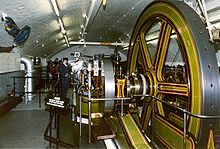Automatio





Automatio,[1] sive moderatio automaria,[1] est technologia qua ratio vel modus operandi auxilio humano quam minimum agitur,[2] quod est usus variorum systematum moderationis ad instrumenta operanda, sicut machinae aliique apparatus industriales, rationes in fabricis, calefactores aquae, tractatio caloris furnorum, commutatio in retibus telephonicis, gubernatio et stabilizatio navium, aeroplanorum, aliorumque vehiculorum, atque aliae adhibitiones, interventione imminuta aut minima humana effectus.
Vocabulum automatio, ex vocabulo automatico (Anglice automatic, ex automaton) ante 1947 raro adhibebatur, cum societas Fordiana provinciam automationis constitueret.[3] Societates industriales illo tempore moderatores retroactionis, qui annis 1930 introducti erant, celeriter accommodabant.[4]
Nexus interni
Notae[recensere | fontem recensere]
Bibliographia[recensere | fontem recensere]
- Autor, David H. 2015. "Why Are There Still So Many Jobs? The History and Future of Workplace Automation." Journal of Economic Perspectives 29 (3): 3. doi:10.1257/jep.29.3.3|hdl=1721.1/109476. Textus.
- Bennett, S. 1979. A History of Control Engineering 1800–1930. Londinii: Peter Peregrinus Ltd. ISBN 978-0-86341-047-5.
- Bennett, S. 1993. A History of Control Engineering 1930-1955. Londinii: Peter Peregrinus Ltd., pro Institution of Electrical Engineers. ISBN 978-0-86341-280-6.
- Caldwell, Darwin G., ed. 2013. Robotics and automation in the food industry: current and future technologies. Oxoniae et Philadelphiae: Woodhead Publishing. ISBN 9781845698010, ISBN 1845698010
- Dunlop, John T., ed. 1962. Automation and Technological Change: Report of the Twenty-First American Assembly. Englewood Cliffs Novae Caesareae: Prentice-Hall.
- Field, Alexander J. 2011. A Great Leap Forward: 1930s Depression and U.S. Economic Growth. Londinii et Portu Novo: Yale University Press. ISBN 978-0-300-15109-1.
- Frohm, Jorgen. 2008. Levels of Automation in Production Systems. Chalmers University of Technology. ISBN 978-91-7385-055-1. Situs interretialis.
- Goldman, Steven L., ed. 1989. Science, technology, and social progress. Bethlehem Pennsylvaniae: Lehigh University Press; Londinii et Cranbury Novae Caesareae: Associated University Presses. ISBN 093422305X.
- Groover, Mikell P. 2020. Fundamentals of modern manufacturing: materials, processes, and systems. Ed. 7a. Hoboken Novae Caesareae: John Wiley & Sons. ISBN 9781119494386 (Adobe PDF), ISBN 9781119475217 (ePub).
- Howard, Nicole. 2005. The book: the life story of a technology. Westport Connecticutae: Greenwood Press. ISBN 031333028X.
- Jerome, Harry. 1934. Mechanization in Industry. Novi Eboraci: National Bureau of Economic Research. PDF.
- Landes, David S. 1969. The Unbound Prometheus: Technological Change and Industrial Development in Western Europe from 1750 to the Present. Cantabrigiae et Novi Eboraci: Press Syndicate of the University of Cambridge. ISBN 978-0-521-09418-4.
- McGaughey, E. 2018. Will Robots Automate Your Job Away? Full Employment, Basic Income, and Economic Democracy. SSRN, pars 2(3).
- Noble, David F. (1984) 1986. Forces of production: a social history of industrial automation. Novi Eboraci: Oxford University Press. ISBN 0195040465.
- Ouellette, Robert. 1983. Automation Impacts on Industry. Ann Arbor Michiganiae: Ann Arbor Science Publishers. ISBN 978-0-250-40609-8.
- Rifkin, Jeremy. 1995. The End of Work: The Decline of the Global Labor Force and the Dawn of the Post-Market Era. Putnam Publishing Group. ISBN 978-0-87477-779-6.
- Trevathan, Vernon L., ed. 2006. A Guide to the Automation Body of Knowledge. Ed. 2a. Triangle Park Carolincae Septentrionalis: International Society of Automation. ISBN 978-1-55617-984-6. Textus in tabulis scriptus, 4 Iulii 2008.
- White House. 2016. Executive Office of the President, Artificial Intelligence, Automation and the Economy. PDF.
- Wit, Dirk de. 1994. The shaping of automation: a historical analysis of the interaction between technology and organization, 1950-1985. Hilversum: Verloren. ISBN 9065504141.
- Zankl, Arnold. 2006. Milestones in automation: from the transistor to the digital factory. Erlangen: Publicis Corporate Publishing. ISBN 3895782599, ISBN 9783895782596.
